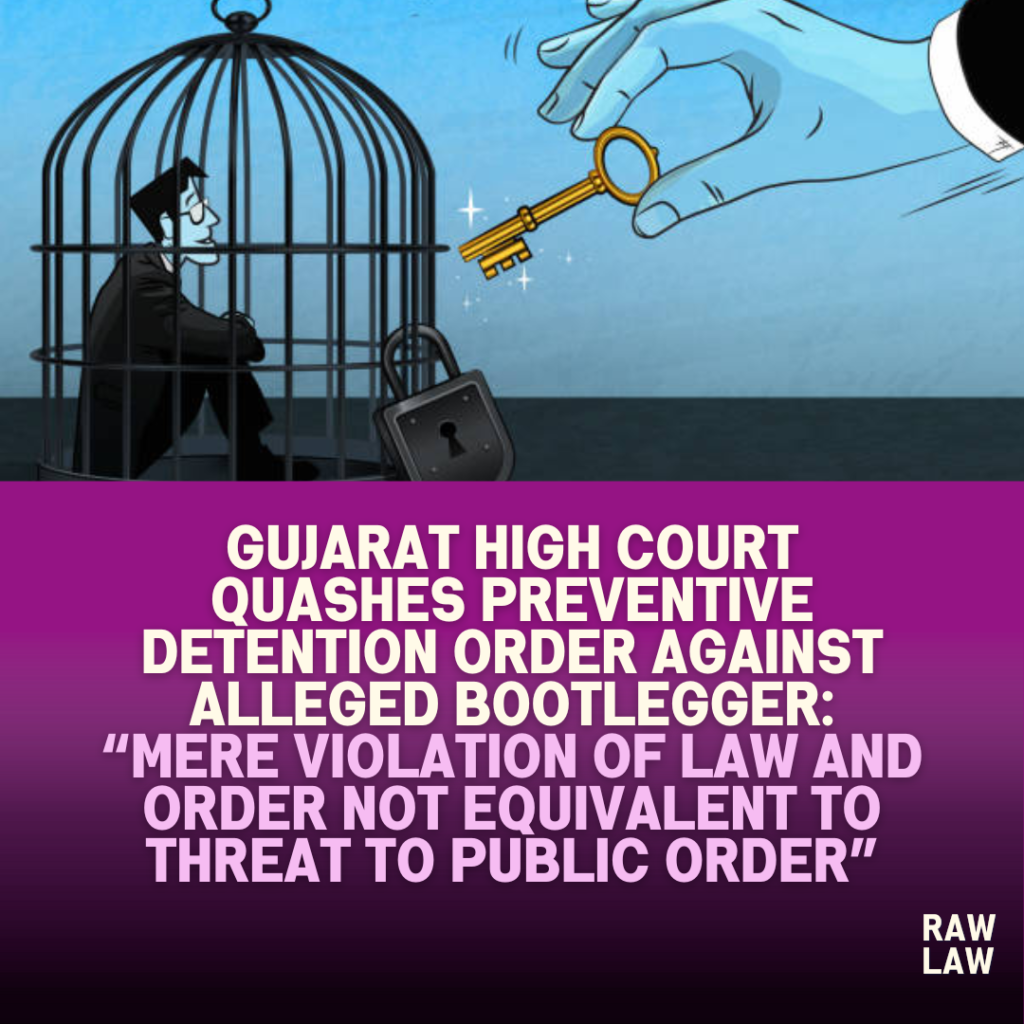Court’s Decision
The Gujarat High Court allowed the petition and quashed the preventive detention order dated 16 May 2025 issued under the Gujarat Prevention of Anti-social Activities Act, 1985. The Court held that the grounds cited by the detaining authority did not demonstrate any real or potential threat to public order, which is a necessary precondition for such preventive action. The Court directed that the detenue be released forthwith if not required in any other case.
Facts
The petitioner was preventively detained under the Gujarat Prevention of Anti-social Activities Act, 1985, on the basis of two prohibition cases registered against him. The first case, dated 23 November 2024, was registered under Sections 65(a)(e), 81, and 116(B) of the Prohibition Act at DCB Police Station. The second case, dated 30 March 2025, was registered under Sections 65(a)(e), 81, 83 of the Prohibition Act and Sections 336(2), 338, and 341(1) of the Bharatiya Nyaya Sanhita at Infocity Police Station. Despite being granted bail in both cases, the Commissioner of Police, Ahmedabad City, passed the detention order classifying the petitioner as a “bootlegger”.
Issues
- Whether the preventive detention order was valid in law.
- Whether the petitioner’s alleged acts impacted “public order” as contemplated under the Gujarat Prevention of Anti-social Activities Act, 1985.
Petitioner’s Arguments
The petitioner argued that the offences alleged against him did not relate to any disturbance of public order, and at most, they amounted to a breach of law and order. He contended that registration of the two prohibition-related offences was insufficient to justify preventive detention. He relied on the statutory explanation under Section 3(4) of the Act to assert that there must be a demonstrable threat to public order to sustain such detention.
Respondent’s Arguments
The State opposed the petition, arguing that the petitioner was a habitual offender whose activities were detrimental to the societal fabric. It was submitted that the detention order was based on the petitioner’s antecedents and was necessary to prevent him from engaging in further activities prejudicial to the maintenance of public order in Ahmedabad.
Analysis of the Law
The Court analysed the distinction between “law and order” and “public order” under Section 3(4) of the Gujarat Prevention of Anti-social Activities Act, 1985. The Bench held that not every contravention of the law affects public order. It emphasised that for preventive detention to be valid, there must be a reasonable apprehension that the detainee’s acts affect the even tempo of public life, beyond individual or localised disturbances.
Precedent Analysis
The Court relied heavily on the following cases:
- Piyush Kantilal Mehta v. Commissioner of Police, Ahmedabad (1989 Supp (1) SCC 322): The Supreme Court set aside a similar detention order based on prohibition cases, observing that such violations pertain to law and order and not public order unless they impact the public at large.
- Pushkar Mukherjee v. State of West Bengal (1969 (1) SCC 10): The Court drew a distinction between “law and order” and “public order”, holding that public disorder arises only when acts affect the community or the public at large, not when the consequences are limited to specific individuals.
Court’s Reasoning
The Court held that the authority had “wrongly arrived at the subjective satisfaction” that the petitioner’s actions warranted preventive detention. It found no material to indicate that the alleged acts created panic, insecurity, or fear among the public to justify such an order. The Court declared that:
“Mere disturbance of law and order leading to disorder is not necessarily sufficient for action under the Preventive Detention Act.”
The Court further noted that being a bootlegger under Section 2(b) of the Act, without a demonstrable impact on public order, is insufficient to invoke preventive detention.
Conclusion
The High Court allowed the petition and quashed the detention order dated 16 May 2025. It directed that the petitioner be set at liberty immediately, provided he is not required in any other case. The Court found that the detaining authority’s satisfaction was neither legal nor sustainable as the material on record did not demonstrate a threat to public order.
Implications
This ruling reaffirms the constitutional safeguard against arbitrary preventive detention. It clarifies that while habitual offences may attract penal consequences, they cannot, by themselves, justify curtailing personal liberty unless there is a real threat to public order. The judgment draws a clear line between law and order violations and situations that genuinely endanger public order, setting a high bar for future preventive detentions under the Gujarat Prevention of Anti-social Activities Act, 1985.
Referred Judgments
- Piyush Kantilal Mehta v. Commissioner of Police, Ahmedabad (1989 Supp (1) SCC 322): Held that two prohibition cases cannot by themselves justify preventive detention in absence of threat to public order.
- Pushkar Mukherjee v. State of West Bengal (1969 (1) SCC 10): Distinguished “law and order” from “public order”; public disorder must affect community life or public interest, not just individual victims.
FAQs
Q1. What is the difference between ‘law and order’ and ‘public order’ in preventive detention laws?
A1. ‘Law and order’ pertains to individual or localised disturbances, whereas ‘public order’ involves disruptions affecting the community or society at large. Preventive detention requires a threat to public order.
Q2. Can a person be detained preventively for being a habitual offender under prohibition laws?
A2. No, unless their actions demonstrably threaten public order. Being a habitual offender alone is not sufficient ground for preventive detention.
Q3. What safeguards does this judgment reinforce in preventive detention cases?
A3. The judgment reinforces that detention orders must be based on objective material demonstrating a real or likely threat to public order, not merely repetitive violations of criminal law.



